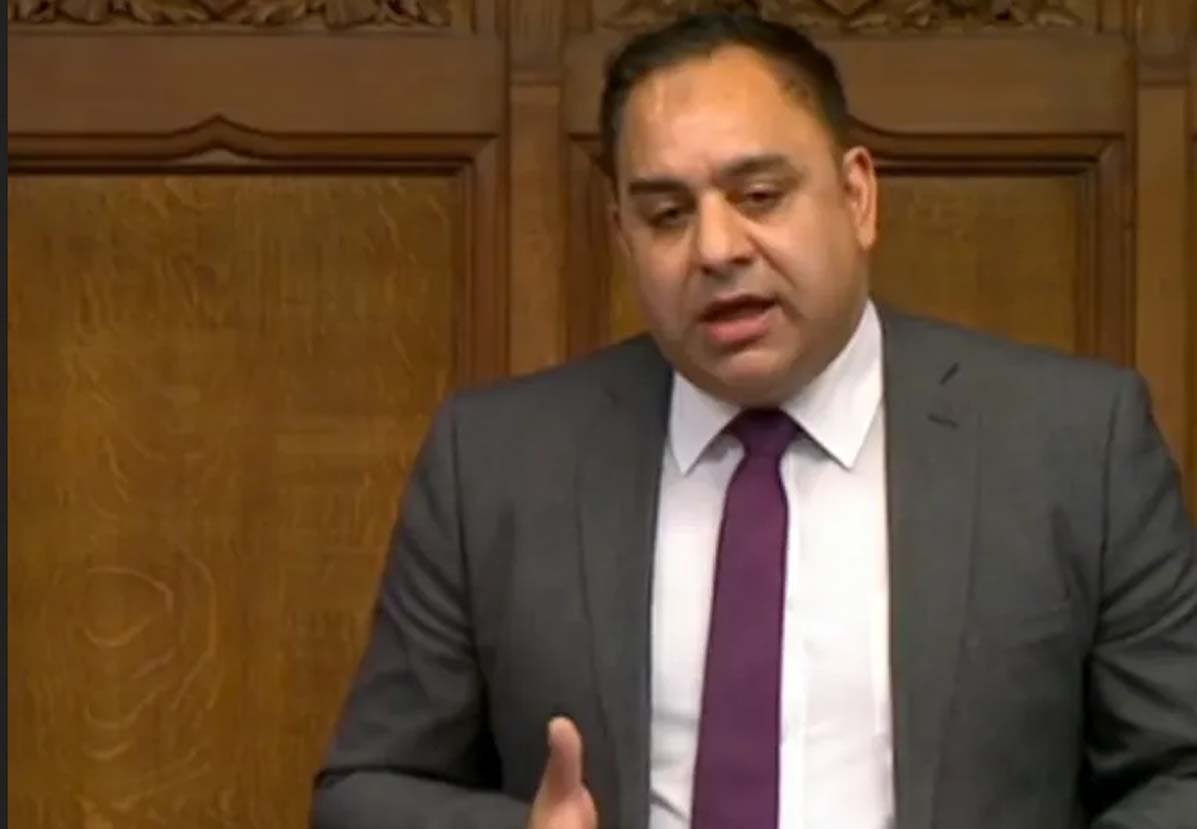
Kier Starmer, leader of the UK’s Labour Party, speaks during the UK’Prime Minister Rishi Sunak’s Ministerial Statement on Israel and Gaza situation, at the House of Commons in London, UK October 23, 2023
Glasgow, United Kingdom – The leader of the United Kingdom’s main opposition party, Labour, has refused to call for a ceasefire in Gaza, a position that is costing him political support and could dent his chances in a new general election.
In recent months, Sir Keir Starmer’s traditionally left-wing party has enjoyed a considerable lead over the UK’s governing, right-wing Conservatives in opinion polls.
But since Israel began its deadly campaign of retaliatory air raids against Hamas on the impoverished Gaza Strip, the former director of public prosecutions (DPP) for England and Wales has been navigating the most volatile period of his three years at the party’s helm.
Late on Tuesday, shadow minister Imran Hussain quit Labour’s front bench in protest at Starmer’s refusal to heed calls from many in his party to push for an Israeli ceasefire.
About 50 Labour Party councillors, many Muslim, had earlier resigned from party itself over Starmer’s position, with some even calling for him to step down.
Starmer, who remains odds-on to become the UK’s prime minister in the country’s next general election, joined other Western leaders in branding the October 7 attacks by Hamas on southern Israel as “terrorism”.
However, weeks into the Israeli state’s bombardment of the Hamas-controlled enclave, where more than 10,000 Palestinians have been killed in some four weeks of merciless shelling, the Labour leader has been fending off accusations of supporting a “genocide”.

Imran Hussain, a front-bench Labour minister, quit on Tuesday in protest against Starmer’s position on Gaza
‘Massive divisions within the party’
Starmer’s woes began after he gave an interview to British broadcaster LBC several weeks ago, in which he appeared to endorse Israel’s military tactic of withholding water and electricity from the people of Gaza.
The presenter asked him if “cutting off power, cutting off water” was appropriate as a response to the October 7 Hamas attacks.
Starmer replied, “I think that Israel does have that right … It is an ongoing situation. Obviously, everything should be done within international law.”
Starmer later tried to clarify his remarks, saying he understood his words had caused “real concern and distress in some Muslim communities”.
“Let me clear about what I was saying, and what I wasn’t saying,” he said. “I was saying Israel had the right to self-defence. When I said that right, it was that right to self-defence… I was not saying Israel had the right to cut off water, food, fuel, or medicines, on the contrary.”
But the damage had already been done.
“The [Labour] resignations show the massive divisions within the party,” Chris Doyle, director of the London-based Council for Arab-British Understanding (CAABU), told Al Jazeera.
“The anger against the leader himself is very personal and is very directed at Keir Starmer for his failure to call a ceasefire, but also to condemn the siege [of Gaza] and his failure to criticise Israel for any of its actions.”
Afrasiab Anwar, the Labour leader of Burnley Council, in England’s northwest, is among those who have resigned.
Quitting was “the most difficult decision” of his political career, he told Al Jazeera.
“It was the LBC interview that sparked it all,” said Anwar, who believes Starmer has “failed” at Labour leader’s first real foreign policy test.
“And his response to that and the backlash which came from that. He’s been trying to recover [ever since] and has failed to do so.”
After assuming control of Labour in April 2020, Starmer set about dismantling the legacy of his pro-Palestinian socialist predecessor, Jeremy Corbyn.
By stark contrast, this week, Corbyn, a lifelong supporter of Palestinian rights, wrote a column published by Al Jazeera in which he argued that the International Criminal Court should investigate possible war crimes in Gaza.
But like Starmer, Corbyn has been heavily criticised, accused by some in the party of failing to deal properly with internal complaints of anti-Semitism.
Starmer has been on a path to detach Labour from the Corbyn era.
Just two months after his term began, Starmer sacked his shadow education secretary, Rebecca Long-Bailey, for retweeting an interview with an actor that he said contained an anti-Jewish conspiracy theory.
He also oversaw the suspension of Corbyn after the former Labour chief was accused of downplaying the findings of a report on anti-Semitism in the Party during his time as leader.
Last month, Labour legislator Andy McDonald was suspended by Starmer for chanting the pro-Palestinian rallying cry “between the river and the sea” during a speech at a Gaza solidarity march.
To many observers, these suspensions and Starmer’s opposition to a ceasefire in Gaza signal his staunch support for the Israeli state.
Longtime pro-Palestinian supporter Pauline McNeill, who sits as a Scottish Labour Party politician in the devolved Scottish Parliament in Edinburgh, told Al Jazeera, “Isaac Herzog, who is president of Israel and an Israeli Labour Party politician, said three weeks ago there was no such thing as an innocent Palestinian civilian … And I actually do wonder if Keir Starmer is listening to any of this.
“I do hope that the Labour Party comes to realise that [there is a] massacre happening right now in Gaza.”
Late last month, 250 Muslim Labour councillors wrote to Starmer demanding that he press for a ceasefire in Gaza.
Whether the UK’s Muslim communities, many of which traditionally vote for the Labour Party and support the Palestinian cause, will revolt against the party in a general election, remains to be seen.
“Gaza has proven a wake-up call to people around me in my community in terms of who will deliver for their interests,” said Aamir Darr, the founder of the Multicultural Bookshop in Bradford, a northern English city where some 30 percent of residents are Muslim.
“And I think the resignation of the Labour councillors, and the Labour shadow minister, is just the first step.”
 Weekly Bangla Mirror | Bangla Mirror, Bangladeshi news in UK, bangla mirror news
Weekly Bangla Mirror | Bangla Mirror, Bangladeshi news in UK, bangla mirror news







